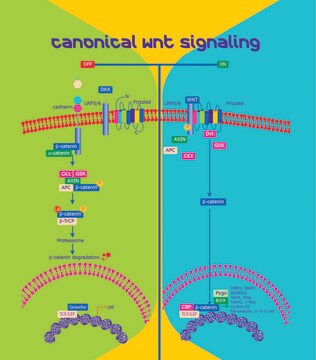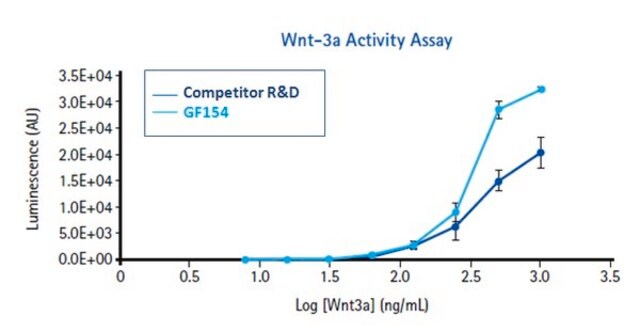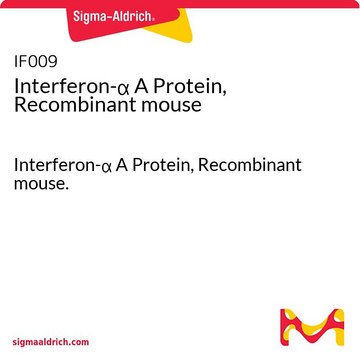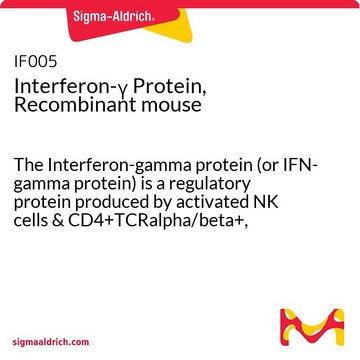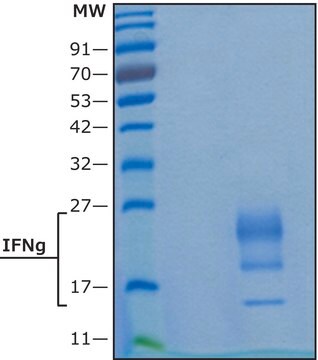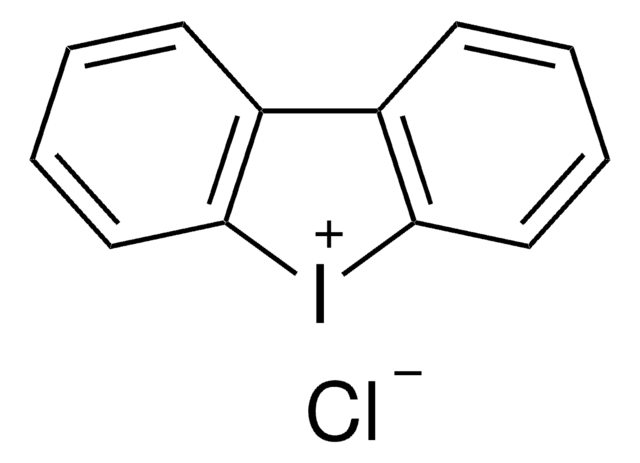GF146
Wnt-5a Protein, Recombinant mouse
The Wnt5a protein is a 352 amino acid protein containing 23 conserved cysteines & contains a cysteine modified by palmitate which is essential for receptor binding & biological activity.
About This Item
Produits recommandés
Niveau de qualité
Fabricant/nom de marque
Chemicon®
Concentration
80-100 ng/μL
Technique(s)
cell culture | mammalian: suitable
Impuretés
<0.1 ng/μg Endotoxin (of Wnt5a)
Entrée
sample type neural stem cell(s)
sample type mesenchymal stem cell(s)
Conditions d'expédition
dry ice
Description générale
Wnt ligands bind to cell surface co-receptors consisting of a Frizzled protein and lipoprotein receptor related protein (5/6). Wnt 5a belongs to the non-canonical class of Wnt proteins which are independent of or inhibit β-catenin signalling. Wnt5a when bound to its receptor triggers an intracellular Ca release which activates PKC and CaMK11 which in turn activates TAK1 MAPkinase-kinase and nemo-like(NLK) kinase. NLK phosphorylates Lef1/TCF protein complex inhibiting the formation of the β-catenin Lef1/TCF DNA complex. In contrast Wnt3a signalling stabilizes β-catenin increasing the formation of the β-catenin Lef1/TCF DNA complex.
Wnt signalling has been implicated in the control of differentiation of stem cells. The Wnts have also been shown to have putative roles in the regulation of adult stem cells. Recently injection of embryonic stem cells into hearts has been shown to correct cardiac defects. This occurs through the secretion of factors from stem cells which correct gene defects in neighbouring cells. Wnt5a, a short term factor secreted by the stem cells, has been shown to be critical for this process (Fraidenraich and Benzra, 2006).
Application
• When using this protein, if possible, dose it directly onto cells at the required dilution without pre-filtering.
• The toxicity of the Chaps in the storage buffer should be tested empirically on the cell line prior to using the Wnt5a protein.
• Generally, we suggest that a minimum dilution of Wnt5a of 1:1000 on mammalian cells results in a final concentration of Chaps that is not toxic to the cells.
• If dosing on cells over a period of days/weeks, it is recommended that media containing Wnt5a is replenished daily, rather than dosing Wnt5a to existing media daily. This is because accumulation of Chaps is undesirable for cell viability.
Conditionnement
Forme physique
Stockage et stabilité
Remarque sur l'analyse
Informations légales
Clause de non-responsabilité
Code de la classe de stockage
13 - Non Combustible Solids
Classe de danger pour l'eau (WGK)
WGK 2
Point d'éclair (°F)
Not applicable
Point d'éclair (°C)
Not applicable
Certificats d'analyse (COA)
Recherchez un Certificats d'analyse (COA) en saisissant le numéro de lot du produit. Les numéros de lot figurent sur l'étiquette du produit après les mots "Lot" ou "Batch".
Déjà en possession de ce produit ?
Retrouvez la documentation relative aux produits que vous avez récemment achetés dans la Bibliothèque de documents.
Articles
Role of growth factors in stem cell differentiation and various growth factors for your research at sigmaaldrich.com
Contenu apparenté
This article shows that a PES membrane containing Stericup Quick Release filter provides an alternative for the pluripotent expansion of embryonic stem cells.
Notre équipe de scientifiques dispose d'une expérience dans tous les secteurs de la recherche, notamment en sciences de la vie, science des matériaux, synthèse chimique, chromatographie, analyse et dans de nombreux autres domaines..
Contacter notre Service technique